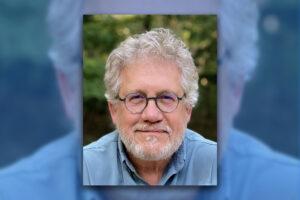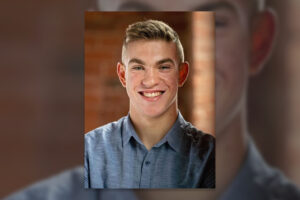And Sometimes Something Else
Nowhere is worth being elsewhere tonight
when I show her what I bought this morning.
A scroll tied loosely with a slender red ribbon.
Painted on the narrowest bamboo slats, a crane
not moving through reeds in a pond’s shallows.
Japanese characters tell the story of the painting,
as if words were needed, as if we can’t understand
what we see. Although she doesn’t know Japanese,
I ask her to translate and so she says,
It can only do what it was born to do.
To the fish it is seeking, its legs are reeds
so they swim without care.
Some will always remain swimming.
Legs move. Reeds move.
Sometimes there’s no difference
in what can be seen
and what is believed.
And sometimes there is
all the difference in the world,
like there is tonight when her hand
rests in mine. No need for pictures,
or characters, or words.
Nothing in need of translation.
My Slender Book—The Loaner Version
Occasionally, not purposefully,
I’ll stop in the stacks and reach for it,
hoping it’s not there, always dismayed
if it is, almost always stunned
when it isn’t on loan, borrowed
and renewed time after time.
But if it is there, I take it down
from its rightful place right next to
any book of poems by Robert Hass,
where it has a good chance
of being discovered by proximity,
if not by reputation or word of mouth.
Standing beneath a rowdy fluorescent light
and the air conditioning pouncing
on my back, I let the book fall open
to whatever page it wants
and read just one page or poem
(sometimes more, or many more,
even though I know most of them
by heart) before putting the book back,
tidying the shelf, but making sure
it projects a bit beyond its neighbors
before moving on to find the book
I came for in the first place.
If my book is nowhere to be found,
you might notice a slight smile
on my face as I wait at the check-out desk,
trying to see the titles of the books
other patrons hold in their hands.
But I sometimes hope someone stole it,
after reading a few lines, because they wanted
to possess it all to themselves, still keeping it
even after misunderstanding a book entitled
Places Near And Far is a much different
guidebook than they’ve ever read before.
Lasting Words
Touching the raised lines,
the scars on her wrists,
with my fingers and lips.
Now you know why
I always wear long-sleeve blouses,
she said. I messed it up.
You have to cut up,
not across the wrists.
Maybe you didn’t
really want to do it,
I said.
Maybe. The world’s full of maybes,
isn’t it? Maybe next time I’ll do it right.
Maybe there won’t be
a need for a next time.
Maybe that’s the best maybe of all.
Guess we’ll just have to wait
and see what comes next.
But until then, don’t stop.
A few months later the phone message
said she was finally going to succeed,
reading the note she was leaving–
Not even this much mercy can save me now.
I’m not sorry. I’m not afraid.
No one is to blame.
No one? Who could that be?
Who should it have been?
Who should have known sometimes
mercy doesn’t arrive with time enough
to save anyone or to erase the words–
blaming no one–that last forever.
Robert Harlow resides in Albany, NY, having moved here from Arizona. He wanted to see if he could survive well below zero temperatures instead of 100-plus-degree temperatures. He’s still wondering why he is prone to such decisions. His most recent book of poems–Places Near and Far–came out in 2018 from Louisianan Literature. He has work in Poetry Northwest, Cottonwood, Aethlon: the Journal of Sports Literature, The Midwest Quarterly, and many other journals. Or so he has been told.





